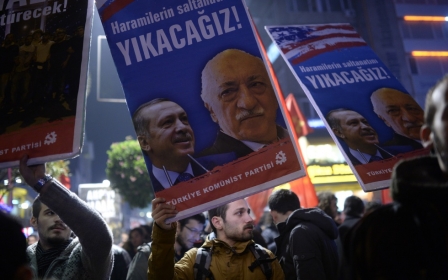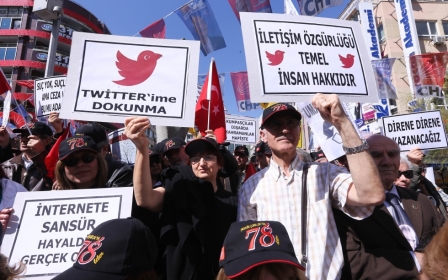Leak reveals US plans for Syria no-fly-zone

The United States has drawn up plans for enforcing a no-fly-zone over Syria and shared them with allied governments, in a move that parallels the stages of NATO intervention that ended with the overthrow of Libyan leader Muammar Gaddafi three years ago.
The US plans were mentioned in leaked tapes of a meeting in the Turkish foreign minister’s office on March 13. Ahmet Davutoglu is heard conferring on the matter with his Under-Secretary Feridun Sinirlioglu, Armed Forces’ Deputy Chief of Staff Lieutenant General Yasar Guler and the Director of the National Intelligence Organisation (Milli Istihbarat Teskilati (MIT)) Hakan Fidan.
The conversation was recorded shortly after the five permanent members of United Nations Security Council reached rare unanimity on Syria. In February, the council passed a resolution that called on all sides in the civil war to provide corridors for humanitarian aid to cross internal front-lines as well as international borders.
Russia has repeatedly resisted Western calls for the UN to support military action against the Assad government, and in discussions among Security Council members before the vote on humanitarian aid they insisted the resolution should include no enforcement provisions in case the Assad government failed to comply.
While US and Turkish officials have regularly consulted on the delivery of weapons and other war materiel to the rebel groups fighting the government of President Bashar al Assad, preparations for a no-fly-zone would mark a significant escalation in US involvement.
The disclosure of US plans for a no-fly-zone suggests air strikes have been revived as Washington’s preferred tactic in the campaign to remove Assad from power. The Obama administration was on the brink of launching bombs and missiles on Syria following a chemical weapons attack last August, but backed down after Assad accepted a Russian proposal to abandon his chemical weapons arsenal.
In Libya in 2011, NATO gave the widest possible interpretation to a UN resolution authorising a no-fly-zone, using it to justify air strikes that destroyed Gadaffi’s air force as well as most of his tanks and armoured vehicles. The strikes changed the military reality on the ground and allowed rebel fighters to seize towns and villages across Libya.
Towards the end of the meeting, Sinirlioglu tells his superior about a consultation the Americans had held with the Turkish Chief of General Staff three days earlier. It was a regular event but on this occasion the content was unusual: “The Americans in that meeting distributed the plans for the No Fly Zone. For the first time. Do you know that?” he asked. Davutoglu makes no comment.
The revelation was one of several explosive disclosures on the leaked tape about Turkey’s role in the war in Syria. Davutoglu has not denied the tape’s authenticity. Instead, he has called it a serious breach of national security, even “a declaration of war”. His office was fitted with encryption and jamming devices to stop mobile and other phones being listened to by outsiders, suggesting that a bug must have been placed in the minister’s room itself.
In fury, the Turkish government banned access to YouTube, where recordings of the leaked tape were available. US officials have declined to respond to questions over the content of the leaked conversation. They confined themselves to condemning the ban on YouTube.
US plans for a no-fly-zone may also be linked to rising tension on the Turkish-Syrian border where warplanes from both countries have been watching each other closely for months. Turkey downed a Syrian helicopter in September and on March 22 this year Turkish missiles from a US-made F-16 brought down a Syrian MiG23 which had allegedly violated Turkish airspace. Opposition politicians in Syria cast doubt on the claim and suggested the Turkish government was looking to provoke incidents that could be used to arouse patriotic feelings in advance of elections.
The foreign ministry tape confirmed that Turkey has been supplying Syrian rebel fighters with weaponry, an issue which is always denied by officials in public. At one point, Davutoglu argues that guns and ammunition are not the main thing. “We couldn’t get the human factor in order”, he says in an apparent allusion to the in-fighting between rebel groups and the difficulty of getting unified leadership among the dozens of fragmented local commanders. Fidan, the MiT boss, adds “We sent around 2,000 trucks loaded with supplies”. General Guler chips in: “Ammo is needed”.
The men also discuss whether to create a justification for sending Turkish troops and tanks across the border to protect a tiny island of Turkish territory inside Syria that houses the tomb of Suleyman Shah, the grandfather of the founder of the Ottoman empire. Fighters from the Islamic State of Iraq and the Levant (ISIL) control the area near the tomb. Fidan says it is easy to create a case for war.
He offers to send four men over the border who would fire missiles towards Turkey in a false flag operation. Turkish tanks would then intervene just as they intervened in northern Iraq in the campaign against armed Kurdish separatists. As the fighters on the Syrian side are linked to al-Qaeda it would be easy to get support for Turkey’s intervention since Turkey would have solid grounds in international law, he says.
Although the four men spend much of their time discussing ideas for expanding the war in Syria, the overall tenor of the meeting tends to be one of improvisation and helplessness rather than crisis and urgency. They complain that their Syria policy has little support from other political parties in Turkey. Sinirlioglu deplores the fact that “national security has been politicised. I don’t remember anything like this in Turkish political history. It has become a matter of domestic policy”.
The foreign minister grumbles that Turkey should have gone to war over Syria in 2011. Fidan sounds incongruous that they would intervene on behalf of a Turkish tomb when they did not to save millions of living Syrians. Davutoglu says he finds it hard to get Turkey’s Prime Minister Recep Tayyip Erdogan to engage on the issue. “I have literally begged Mr Prime Minster for a private meeting”, he says.
Above all, the officials sense there would be massive reprisals within Turkey if they attacked Syria in a major way. “The second after it happens, it’ll cause a great internal commotion. Several bombing events are bound to happen. The border is not under control”, laments the director of national intelligence.
His words stand as an epitaph for Turkey’s Syria policy three years after the crisis erupted. Ankara first tried to negotiate with Assad, then it switched to support for Syria’s armed opposition, now it seems to be backing US plans for military strikes. Meanwhile, the refugee crisis that is putting a huge burden on Turkey’s social and economic fabric looks set to grow.
Stay informed with MEE's newsletters
Sign up to get the latest alerts, insights and analysis, starting with Turkey Unpacked
Middle East Eye delivers independent and unrivalled coverage and analysis of the Middle East, North Africa and beyond. To learn more about republishing this content and the associated fees, please fill out this form. More about MEE can be found here.



